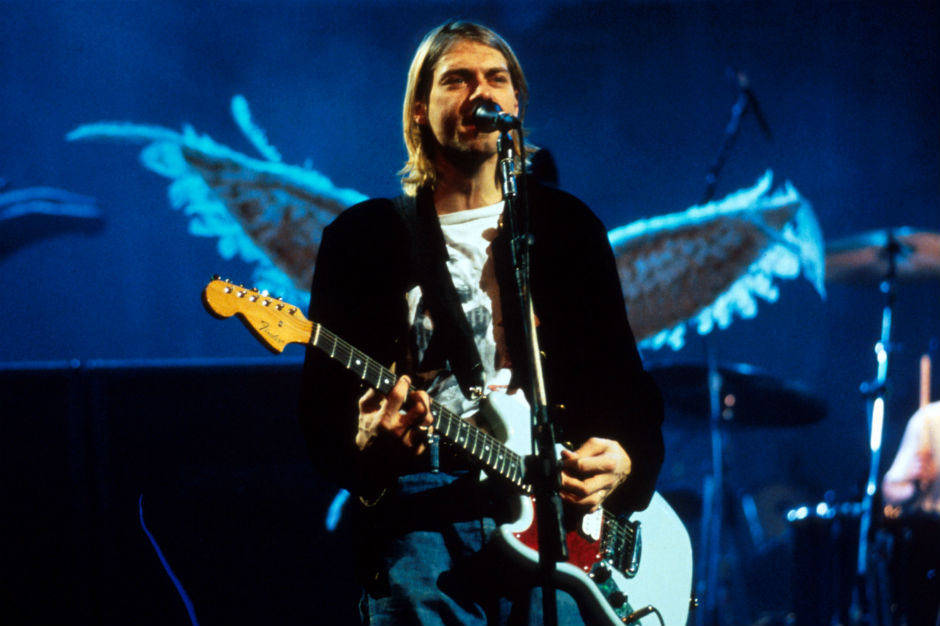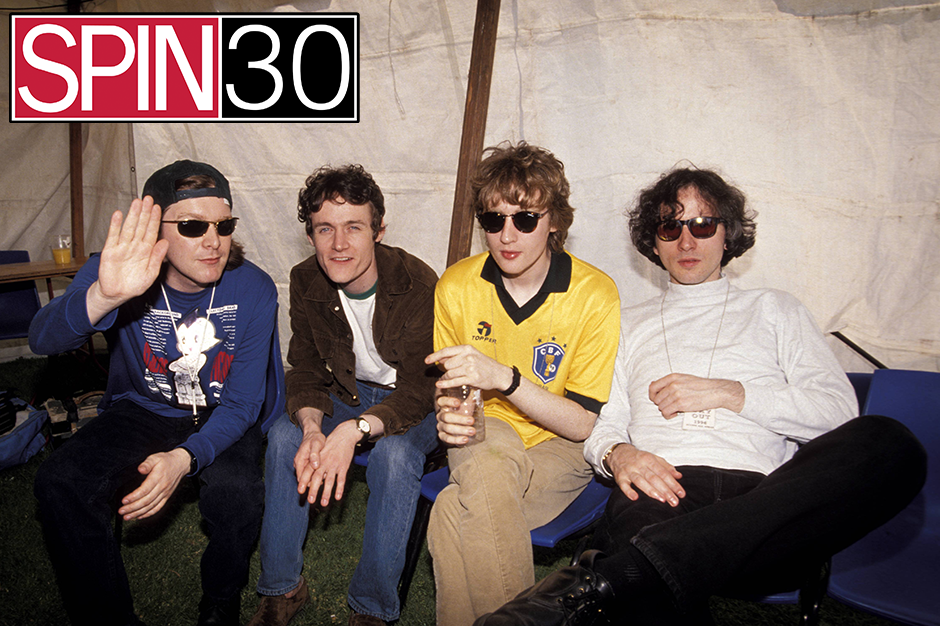On March 19, 1985, the first issue of SPIN hit newsstands. To celebrate our 30th anniversary, we’re revisiting a handful of records that the staff has previously awarded “Album of the Year,” a distinction the magazine started giving out in 1990.
The year 1991 was a pivotal one in the course of alternative-rock music, with standard-bearing, game-changing albums released by U2, My Bloody Valentine, Pearl Jam, and of course, Nirvana, whose breakthrough album, Nevermind, would go on to define the genre for the rest of the decade to come. Even outside of the alt-rock realm, Massive Attack’s Blue Lines set the blueprint for the trip-hop movement that would consume the mid-’90s, the Orb’s Adventures Beyond the Ultraworld served as the ambient-house comedown to the first era of classic U.K. rave, and A Tribe Called Quest inspired a generation of future hip-hop producers with their jazz-rap masterpiece, The Low End Theory. It was a year of classic, singular LPs, ones still viewed as benchmarks nearly a quarter-century later.
But in 1991, SPIN gave the Album-of-the-Year honor to Bandwagonesque, a collection of very nice jangle-pop songs by unassuming Scottish quartet Teenage Fanclub — a band who wonders today if they’ve ever actually influenced anyone.
And you know what? We weren’t necessarily wrong to do so. Bandwagonesque can’t keep up with Nevermind, The Low End Theory, or Loveless when it comes to influence or historical import, but in simple song-by-song terms, the album can still go 12 rounds with anyone. From power-pop sing-along opener “The Concept,” with its instantly iconic Status Quo-referencing opening lines, through the extended fade-out of lighter-waving instrumental closer “Is This Music?,” Bandwagonesque is as hook-filled and generally winning as any guitar-rock album of the decade. It’s an LP that’s virtually impossible to have anything but positive memory associations with.

Also Read
THE DAY THE MUSIC DIED
Catching up with Teenage Fanclub 24 years after their historic upset, we asked the band about some of their own memories of the album, including the AOTY win in these pages, the inspirations behind some of the album’s most memorable tracks, and some of the less-than-stellar music videos of the accompanying era.
Do you guys remember being named Album of the Year in 1991 by SPIN? Did that mean anything to you guys back then?
Norman Blake (Vocals/Guitar): Of course we do, yeah. And I guess it came as a surprise to us. Until we met with Steven Daly, who I think was possibly Features Editor or Reviews Editor. And Steve, of course, played in the Glasgow band Orange Juice.
Do you guys remember the albums that it beat?
Blake: Well, obviously the Nirvana Nevermind record was around at the time. We had the chance of touring with them.
Raymond McGinley (Vocals/Guitar): R.E.M. [Out of Time].
Blake: My Bloody Valentine [Loveless] too, yeah.
Were you guys fans of those albums?
Blake: Sure, yeah, My Bloody Valentine definitely. That’s a great record. All the albums that we mentioned are pretty great albums.
Do you feel like that’s become a part of the album’s legacy, winning the SPIN 1991 Album of the Year?
Blake: Certainly, it’s something that people mention to us from time to time. And it was great for us in terms of people being exposed to the record. Suddenly there were a lot of people aware of the album. Sadly, the problem was that people didn’t go out and buy it. Well, some of them did…
Did that change your profile in America? Was it suddenly easier to get gigs or anything?
McGinley: From that point of view… that would’ve been in late ’91 or ’92, when that happened. There was a lot of stuff going on around that time. We were on Saturday Night Live. We didn’t really know what Saturday Night Live is. A TV show? It didn’t really seem as big a deal to us as it did to other people. But that was part of the immediate culture around it. It kinda meant more to other people than it meant to us.
At that time, everything just kind of washed over us… it seemed huge to people, but to us, it was just something that we did. We didn’t know anything about the show. Same, if someone gives us Album of the Year, you know, that’s really flattering, but to people living in Glasgow, it didn’t quite have the same resonance to someone living in this country. Most of the things that happened at that time didn’t have so much impact on us in what we did.
With SPIN, it wasn’t really something we were aware of so much. It was kind of amusing to us at the time, because y’know, obviously it’s a very good thing to happen, but for us, people would have to explain what the TV show and the magazine was. It didn’t really feature in our consciousness.
Was it a priority for the band to break America in those days?
Blake: It was a priority for us to go anywhere in the word we could go. And partly that was, we went to America as soon as we were on Matador. And we just wanted to travel, go places where we had connections and references to other bands and people in our nest. But the concept of breaking America… we never really thought in those kind of terms, it seems like a coldly analytical thing.
But we loved going there. We went there in 1990; we were sleeping on people’s floors and driving around in some dodgy old car. It was part of the experience. There was no concept of breaking anything, yeah.
Gerard Love (Vocals/Bass): When we signed with Matador, the first trip we made to the U.S., and the first time in New York City, we were there for like ten days, and we slept on the floor of the Matador office. When we had to do to our morning washing, we had to go to the communal washroom. We had just started, we were just running along, we didn’t really have any time.
Did you guys approach the recording of the album any differently than you did with the first two?
Blake: I think we recorded the album before we signed with Geffen. So we had a few labels talking to us, but they all kind of knew what they were getting. We had basically finished the album at that point.
What were you guys listening to at the time? I’ve heard the album gets referred to as “The Fourth Big Star Album,” but was that actually a big influence for you?
Blake: It’s definitely an influence, but one of many. But I think what happened was that we perhaps mentioned to an English journalist a number of records that we’d been listening to, but he kinda picked up on that one, the Big Star reference in particular. Perhaps because they were the most obscure band that we had picked as an influence. They hadn’t been back yet, the records just kind of disappeared…
Was there a specific person you guys knew that inspired the protagonist in “The Concept”? Was that story based on anything?
Blake: I think I just made it up about 20 minutes before recording the song. With that album we definitely wrote a lot of lyrics in the studio. And I think I just wanted to write something with a narrative, actually. And really, I’d come up with the first couple of lines and that really informed the rest of the song. I had this image of a person…. and I loved the idea of getting in the name “Status Quo” in a song, the name of that band. And I think I had the first line and that suggested the rest of it.
Did you hear from the Status Quo? Did they ever comment on the song?
Blake: We haven’t met them, sadly. We’re not massive fans of the band, but they had some good tunes. “Pictures of Matchstick Men,” that’s a good one. And “Rockin’ All Over the World”… actually that’s a John Fogerty song, isn’t it? Their version’s pretty good.
Where did the metal influence to the album come from? Between “Metal Baby” and a couple of the interludes…
Blake: I think actually we were just having a bit of a fun. I don’t think any of us consider ourselves fans of metal, but it was just the image of that… we weren’t taking anything too seriously at that point. You can never be too precious about that sort of thing.
Did you guys dislike making music videos? The videos for the Bandwagonesque singles, they’re sort of no-frills. Was that something you cared about?
Blake: We did some videos originally with Douglas Hart, who was the bass player in Jesus and Mary Chain, a friend of ours. And then when we went to Geffen, we had some videos done… I don’t think those were particularly great. And I don’t think they particularly represent us a band, or people. I think Douglas really understood us more than people who made the Geffen videos, who were people that we didn’t know that we were chosen for us. But I’ve not seen those videos for quite a long time…
McGinley: I think back then, if we had foreseen the invention of the Internet and of YouTube, we wouldn’t have made those videos! The record label’s like, “We want to make a video, and we’ve got this idea,” and we’re like, “Ach, it looks like shit, but it’s only one day, let’s just go along with it. It’ll be gone in a few months…” We didn’t realize how much [a couple of] days of our life can have a disproportionate effect on people’s perceptions of us. That’s what happens when you just kind of go along with things.
Did that album set you guys up for the rest of the decade? Was it hard to follow up?
McGinley: It’s hard to follow other people’s expectations, but I think after that, we wanted to do something else, like everyone does. I don’t think we were ever gonna do that sort of same thing again. I think once you start trying to fulfill other people’s expectations of you, it’s gonna die, you know?
Blake: Because of all of the relative success of the album, the label would indulge us for a few albums before thinking about dropping us. So I really think those later records, Grand Prix and Songs From Northern Britain… it did set us up for a few years [for those].
Did you feel more disconnected to the ‘90s alternative culture as it became obvious that in the U.S., the thing was gonna be grunge, and in the U.K., it was gonna be Britpop? Was it hard to fit in to either scene at that point?
Blake: I think originally, we felt more akin to U.S. bands. People like Yo La Tengo, who we’re still good friends with, and Sonic Youth, who we did some shows with early on. I guess just logistically, because we live over here, it was easier to fit in Europe. And as the years have gone by, it’s been harder for us to tour in the U.S. But I don’t think we ever really felt any particular affinity with the Britpop thing here. In fact, the title of Songs From Northern Britain was kind of a joking reference to Britpop, and everybody who thought we were part of that scene, whatever that was.
Is there a divide between the U.S. and the U.K. in terms of what album or what period you guys feel like you’re best remembered for?
Love: Definitely. I think in the U.S., people think of us with Bandwagonesque. And I think in the U.K. people talk about our best period being Grand Prix and Songs From Northern Britain. Of course, they’re both wrong there, because our best period is right now! [Laughs.]




